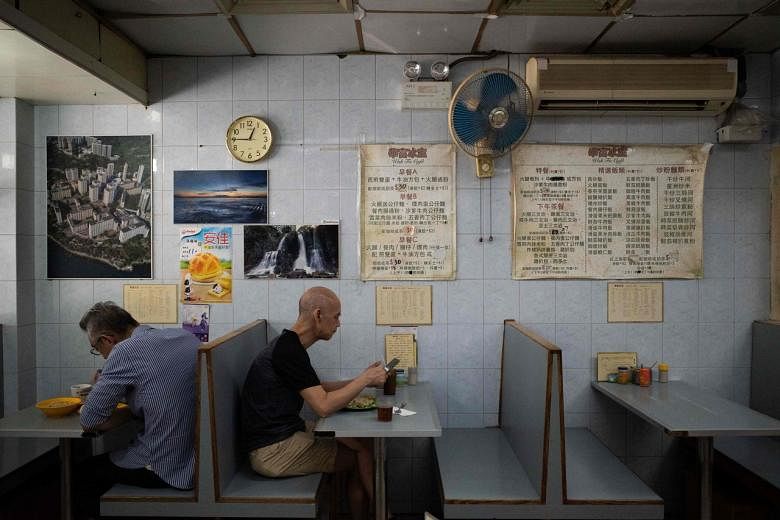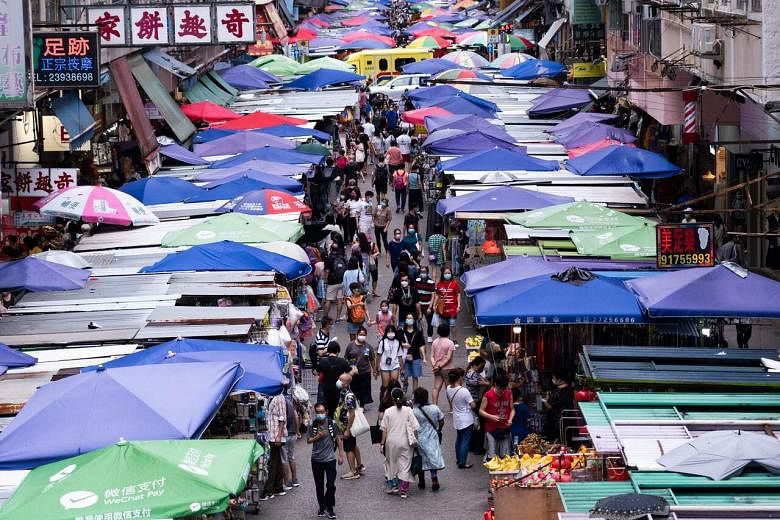HONG KONG - For months now on Friday nights, Hong Kong's Lan Kwai Fong district looks just like how it was pre-pandemic: bars and pubs opening their doors till 4am to local and expat partygoers wearing costumes and hats and dancing to live performances, while chatter fills restaurants that can now sit up to 12 customers a table.
In a city still chasing a zero-Covid-19 strategy, borders may be mostly shut to non-residents but life has largely returned to normal.
Students attend lessons in schools, the office crowd goes about its daily routine, trains and buses are crowded, and hospitals cope with patient load.
People are more relaxed now, although there are still signs of caution. For instance, face masks are still worn, cinemas do not allow food and drinks, and karaoke lounges no longer serve buffets.
On Thursday (Oct 7), Hong Kong recorded eight imported cases. There have been no locally transmitted cases in the territory of 7.4 million people in almost two months.
The scene today is a far cry from the red alert phase in November last year, when clusters popped up islandwide, sparked by dance clubs for socialites. The high alert lasted for months, with the government tightening social distancing rules and rolling out ambush lockdowns on buildings, during which everyone on the premises was tested.
By late February, social distancing rules had eased and life slowly went back on track.
Experts have attributed Hong Kong's success in staving off another wave of outbreaks to a combination of strict border controls and quarantine, social distancing, as well as aggressive contact tracing, testing, screening and surveillance.
Although the Delta variant was found in the community in June, Hong Kong managed to quickly snuff it out so that it did not spread in what is largely a Covid-19-naive population. Since the city saw its first patient on Jan 23, 2020, it has had only about 12,250 cases and 213 deaths.
Epidemiologist Ben Cowling at the University of Hong Kong thinks the city's most important measure in keeping a lid on cases is its strict on-arrival hotel quarantine that can go up to 21 days.
But the flip side of having some of the world's toughest border rules and quarantine measures is how it has taken a toll on the Asian financial hub's recovery, which has been uneven.
That said, its economy continued to grow in the second quarter by 7.6 per cent from a year ago, buoyed by improving global economic conditions and a stable pandemic situation.
The tough stance on overseas arrivals, however, has drawn flak from businesses. In a rare open letter to Hong Kong leader Carrie Lam in August this year, the European Chamber of Commerce in Hong Kong cautioned that the city's business reputation was at risk.
But Mrs Lam replied that many local and international companies had told her repeatedly that they want to enter mainland China to talk to investors and consumers, so Hong Kong's priority has been on its borders with the mainland.
Zero-Covid-19 strategy

In a bid to reopen its borders with the mainland and Macau, Hong Kong has adopted their strategy of zero local infections.
Its priority has been to control the pandemic and prevent imported cases from spreading the virus to the community.
During the flare-up of cases last November, the government tightened rules, including shutting dance clubs, limiting diners to two per table, closing entertainment venues and suspending schools.
From late January, ambush lockdowns were conducted. These were overnight operations where typically one or two buildings or streets identified as sites of infections were sealed off. Everyone in the affected area was tested and had to remain on the premises till given the all-clear, usually by morning. Those who refused to be tested risked a fine of HK$5,000 (S$873). About a dozen Covid-19 cases were detected from late January to end-May.
With no local transmission now, such lockdowns have tapered off but this is a tool officials can still use to quickly detect possible spread.
The city is also maintaining contact tracing and social distancing rules such as mask-wearing and limiting public gatherings to four.
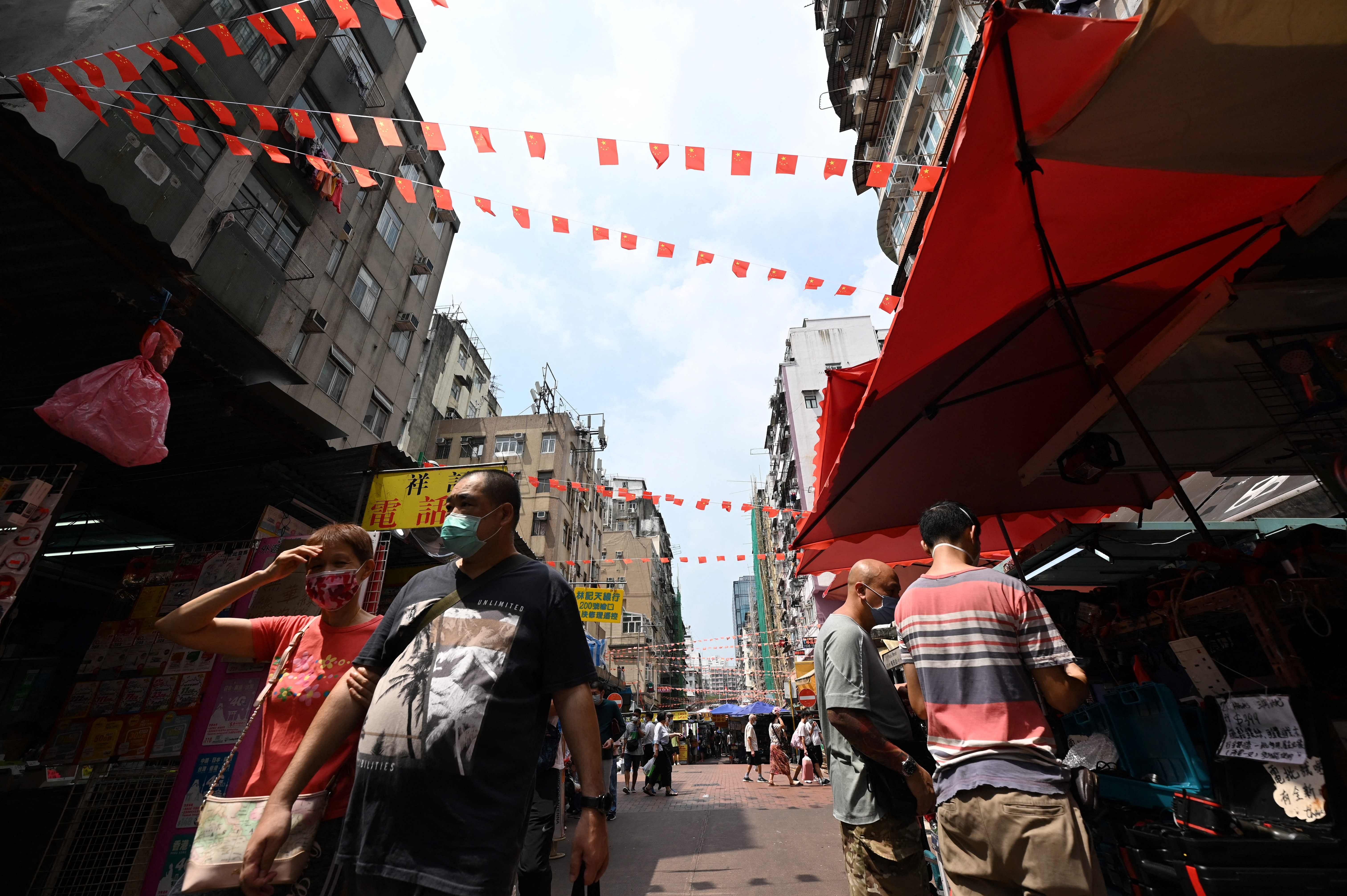
It has also introduced more relaxed measures for diners and eateries under a tiered approach. For example, more people can sit at a table and eateries can operate for longer if both staff and diners are vaccinated.
The government takes a multi-bureau approach in tackling the pandemic, where the various ministries discuss and seek the opinions of an expert panel. The Executive Council, together with the Chief Executive, will then make decisions based on the recommendations. As the situation stabilised, the government has done away with daily press conferences and now sends out press releases daily.
Consultant Morgan Lam, 35, said Hong Kongers like her are tired of the strict policies.
"I don't think it's back to normal. It's the bare minimum of returning to a normal life since there are still regulations on patrons per table, wearing of masks and group sizes in public, a travel ban, quarantine, among other things," she said.
Expat Siobhan Ho, in her 30s, thinks the border measures are too strict but there are some perks.
"The silver lining is that once in the city, it feels like a safe bubble. Other than the lack of freedom to travel, life feels normal," she said.
Border controls
Local media has reported that the border with China can reopen to Hong Kongers only before February 2022 at the earliest, after Hong Kong officials develop a health app that must meet Beijing's conditions for allowing quarantine-free travel into the country.
Currently, Hong Kong has three categories for countries - high risk, medium risk and low risk.
Only fully vaccinated Hong Kong residents can enter the city if they are from the 25 high-risk places, including Brazil, Canada, Indonesia, the United States and the United Kingdom.
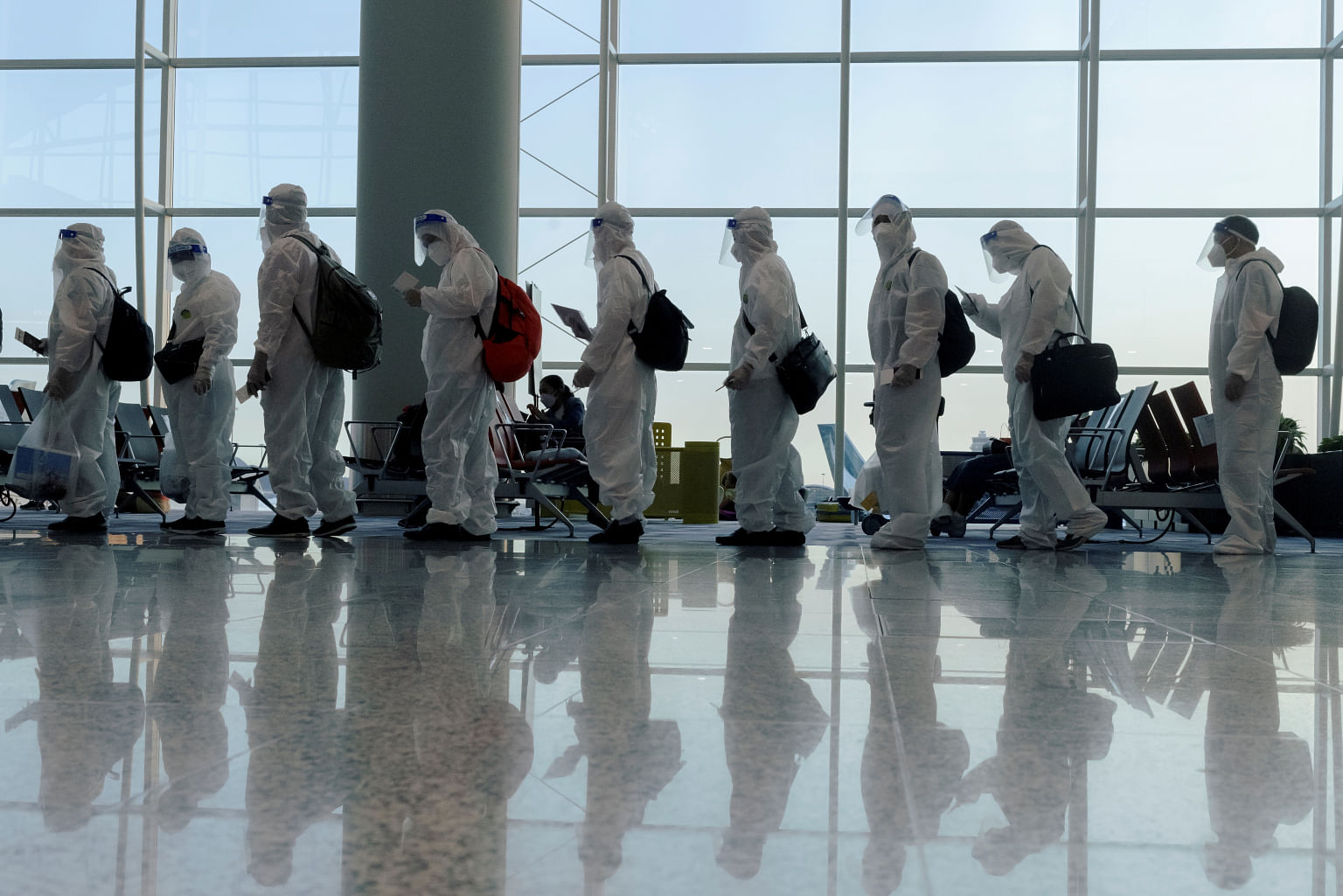
The medium-risk category includes Australia, Singapore, Japan and South Korea. All Hong Kong residents from these places are allowed in, as well as fully vaccinated non-residents.
New Zealand is the only one considered low risk. Residents of Hong Kong and non-residents can enter regardless of vaccination status.
All arrivals must take a nucleic acid test before the flight and face at least seven tests in Hong Kong, besides a mandatory quarantine of between seven and 21 days in designated hotels. The riskier the places the travellers come from, the longer the quarantine period.
The strict rules effectively close off the city to most international travellers.
In the past two weeks, Hong Kong recorded 84 imported cases.
Testing, contact tracing
Hong Kong's low Covid-19 cases in the past five months have helped officials and healthcare staff cope.
That said, the healthcare system came under immense pressure in previous waves of the pandemic. But the situation ebbed with aggressive mass testing to identify patients, and the cooperation of residents, who stayed home.
In September last year, the government rolled out a voluntary two-week mass testing exercise that detected more than a dozen carriers from about 1.8 million people.
Currently, testing is mandatory for workers in certain sectors such as construction and food and beverage. Unvaccinated staff of places such as nursing homes and government departments are also subject to nasal and throat swabs every one to two weeks.
"More frequent testing - that is, on an alternate day or at least twice per week for staff regularly exposed to imported cases - is needed to allow early detection before there are more than two generations of transmission," said Dr Leung Chi Chiu of the Hong Kong Medical Association.
This is because rapid containment by conventional contact tracing is virtually impossible when transmission links become blurred after multiple generations of community transmission, he added.
Vaccination
Hong Kong offers two Covid-19 vaccines - Sinovac and Pfizer-BioNTech.
About 63 per cent of its eligible population - those aged 12 and above - have had two doses of a vaccine, while 67 per cent have had at least the first shot.
The expert panel advising the government has said there is no urgency for booster shots since there has been no outbreak for months. It is of the view that a third dose would not be needed until two to three months before borders reopen.
Vaccine hesitancy is high and officials face the most resistance from the elderly. So far, a mere 15 per cent of those aged 80 years and above have received the first shot, while it is 41 per cent for seniors aged 70-79 and 60 per cent for those aged 60-69.
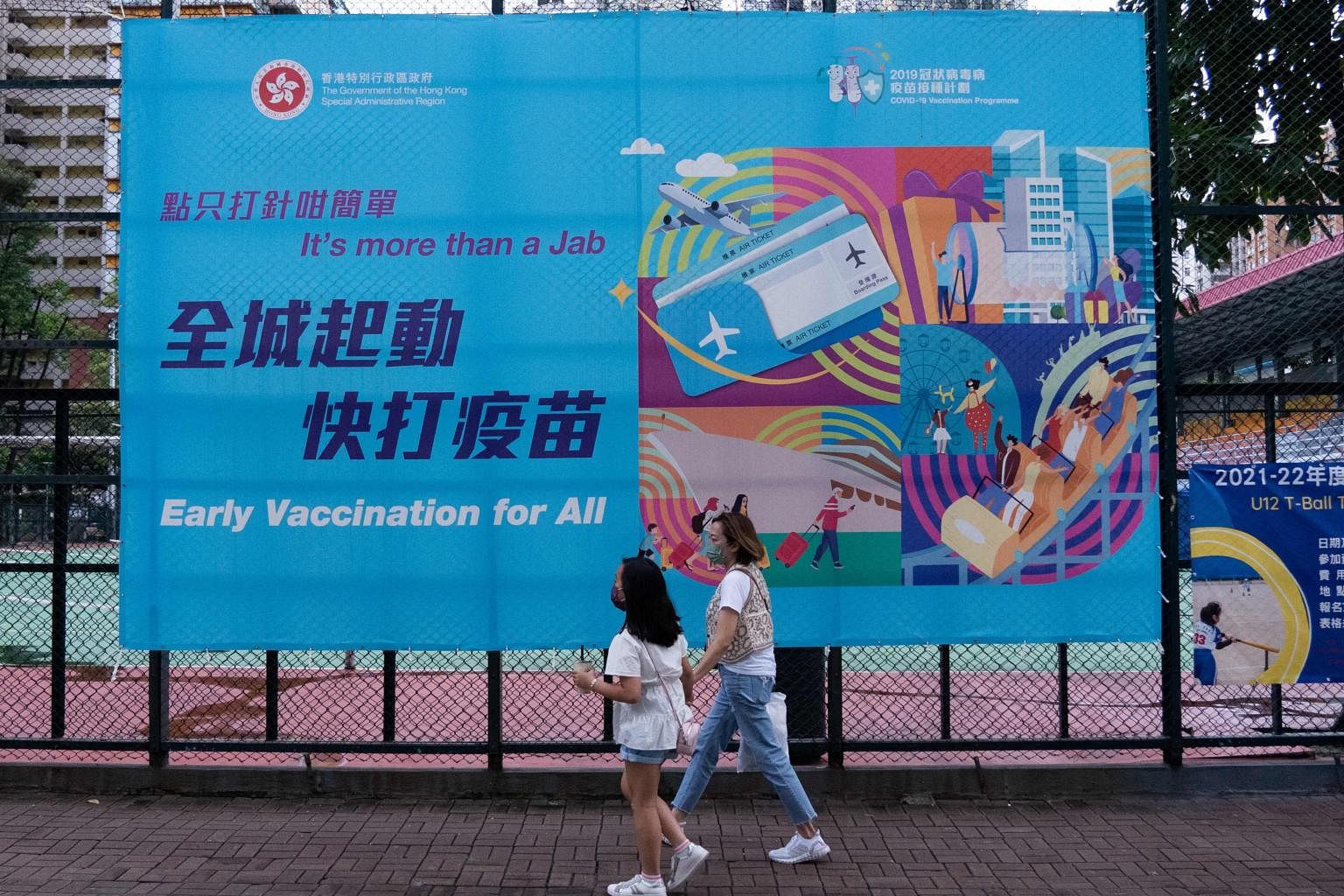
Dr Leung noted that the vaccination rate among those aged over 70 is still very low in Hong Kong. It is "in no position to retreat to the second line of defence of the healthcare system and allow natural infection to close any remaining gap in herd immunity before the infection turns endemic", he said.
Ms Lam, who is fully vaccinated, said she feels that Hong Kong's vaccination rate "is decent". But she thinks that the more infectious variants like Delta have "exposed the weaknesses of the first-generation vaccines".
"It's unlikely that Hong Kong will hit herd immunity since this is an ageing population and one where seniors make up a good proportion of the population," she said.
Government data released last year showed that in 2019, seniors aged 65 and above, at 1.3 million people, made up 18 per cent of the population.
Immunity, hygiene
Dr Carol Tan of the Good Life Medical Centre thinks Hong Kong's virus resilience could be linked to the population's "immune fitness" or level of immunity, as well as high personal hygiene.
She cited a study by the Miller School of Medicine at the University of Miami which found that having a flu jab before lowers a Covid-19-infected person's likelihood of getting severe body-wide infection, blood clots, stroke or even having to be treated in an intensive care unit.
The research's co-author, Dr Devinder Singh, said influenza vaccination "can dually act to prevent a coronavirus and influenza 'twindemic'".
Said Dr Tan: "If you have yearly flu vaccines, you're more able to combat viral infections. Hong Kong, like the UK, has been doing yearly flu jabs."
She added that immune fitness is linked to the process of immune dysfunction that occurs with age. "I think immune fitness is not just about vaccination but also about lifestyle, diet and better control of chronic diseases," said Dr Tan.
And vaccine efficacy is dependent on multiple factors, including immune fitness, vaccine type, how it is produced and the dosage, she added.
As at end July this year, between 38 per cent and 60 per cent of Hong Kong children aged six months to 12 years had taken the flu jab, while between 12 per cent and 45 per cent of seniors aged 50 and above had it.
A 2019 Singapore national population health survey showed that only 17.4 per cent of people aged 18-74 took a flu jab within the past 12 months of the poll.
But other experts pointed out that the study does not show causation nor suggest a clear causal link on how flu jabs would help.
Dr Tan also said another factor that helps keep infections down is Hong Kong's high personal hygiene awareness, driven by past experiences.
The city was scarred by the 2003 severe acute respiratory syndrome outbreak that infected more than 1,700 people and led to 299 deaths or a fatality rate of about 17 per cent.
For now, experts are concerned about winter - when people spend more time indoors and the virus lives longer in cold weather - which will be a test of control measures globally.
"Some countries may achieve herd immunity by vaccination, including the third dose, some unfortunately by major outbreaks and some by both," said Dr Leung.
"When some form of herd immunity has been achieved in different parts of the world, Covid-19 will be closer to an endemic disease and the world may be more ready to live with it like influenza."

